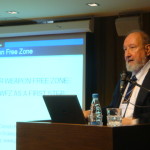Culture, Education and Human Solidarity
TRANSCEND MEMBERS, 4 Jan 2016
John Scales Avery – TRANSCEND Media Service
 Cultural and educational activities have a small ecological footprint, and therefore are more sustainable than pollution-producing, fossil-fuel-using jobs in industry. Furthermore, since culture and knowledge are shared among all nations, work in culture and education leads societies naturally towards internationalism and peace.
Cultural and educational activities have a small ecological footprint, and therefore are more sustainable than pollution-producing, fossil-fuel-using jobs in industry. Furthermore, since culture and knowledge are shared among all nations, work in culture and education leads societies naturally towards internationalism and peace.
Economies based on a high level of consumption of material goods are unsustainable and will have to be abandoned by a future world that renounces the use of fossil fuels in order to avoid catastrophic climate change, a world where non-renewable resources such as metals will become increasingly rare and expensive. How then can full employment be maintained?
The creation of renewable energy infrastructure will provide work for a large number of people; but in addition, sustainable economies of the future will need to shift many workers from jobs in industry to jobs in the service sector. Within the service sector, jobs in culture and education are particularly valuable because they will help to avoid the disastrous wars that are currently producing enormous human suffering and millions of refugees, wars that threaten to escalate into an all-destroying global thermonuclear war.
http://www.fredsakademiet.dk/library/need.pdf
http://eruditio.worldacademy.org/issue-5/article/urgent-need-renewable-energy
Human nature has two sides: It has a dark side, to which nationalism and militarism appeal; but our species also has a genius for cooperation, which we can see in the growth of culture. Our modern civilization has been built up by means of a worldwide exchange of ideas and inventions. It is built on the achievements of many ancient cultures. China, Japan, India, Mesopotamia, Egypt, Greece, the Islamic world, Christian Europe, and the Jewish intellectual traditions all have contributed. Potatoes, corn, squash, vanilla, chocolate, chili peppers, and quinine are gifts from the American Indians.
http://eruditio.worldacademy.org/article/evolution-cooperation
We need to reform our educational systems, particularly the teaching of history. As it is taught today, history is a chronicle of power struggles and war, told from a biased national standpoint. We are taught that our own country is always heroic and in the right. We urgently need to replace this indoctrination in chauvinism by a reformed view of history, where the slow development of human culture is described, giving credit to all who have contributed. When we teach history, it should not be about power struggles. It should be about how human culture was gradually built up over thousands of years by the patient work of millions of hands and minds. Our common global culture, the music, science, literature and art that all of us share, should be presented as a precious heritage – far too precious to be risked in a thermonuclear war.
We have to extend our loyalty to the whole of the human race, and to work for a world not only free from nuclear weapons, but free from war. A war-free world is not utopian but very practical, and not only practical but necessary. It is something that we can achieve and must achieve. Today there are large regions, such as the European Union, where war would be inconceivable. What is needed is to extend these.
Nor is a truly sustainable economic system utopian or impossible. To achieve it, we should begin by shifting jobs to the creation of renewable energy infrastructure, and to the fields of culture and education. By so doing we will support human solidarity and avoid the twin disasters of catastrophic war and climate change.
_______________________________________
John Scales Avery, Ph.D., who was part of a group that shared the 1995 Nobel Peace Prize for their work in organizing the Pugwash Conferences on Science and World Affairs, is a member of the TRANSCEND Network and Associate Professor Emeritus at the H.C. Ørsted Institute, University of Copenhagen, Denmark. He is chairman of both the Danish National Pugwash Group and the Danish Peace Academy and received his training in theoretical physics and theoretical chemistry at M.I.T., the University of Chicago and the University of London. He is the author of numerous books and articles both on scientific topics and on broader social questions. His most recent book is Civilization’s Crisis in the 21st Century (pdf).
This article originally appeared on Transcend Media Service (TMS) on 4 Jan 2016.
Anticopyright: Editorials and articles originated on TMS may be freely reprinted, disseminated, translated and used as background material, provided an acknowledgement and link to the source, TMS: Culture, Education and Human Solidarity, is included. Thank you.
If you enjoyed this article, please donate to TMS to join the growing list of TMS Supporters.

This work is licensed under a CC BY-NC 4.0 License.